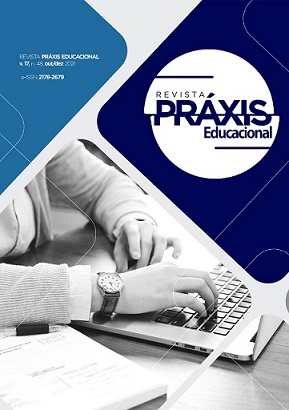Archeology as methodology and biopolitics as speech
DOI:
https://doi.org/10.22481/praxisedu.v17i48.8946Keywords:
Curriculum, Methodology, FoucaultAbstract
We will deal here with the Foucaultian itinerary, associated with the notion of Biopolitics, politics of life, or how political economy builds discourses that directly affect the field of Education, in research itineraries (methodologies?) that use or not the Foucaultian perspective. This article is divided into three parts, namely, (1) archeology as “scientific methodology”, (2) methodological itineraries as discourse and (3) biopolitics as discursive production. In the first part, we will study the notion of Foucault's archeology as a method of research and discursive production. In the second part, we will analyze three research itineraries from three articles: National Common Curriculum Base: new forms of sociability producing meanings for education, by Elizabeth Macedo (2014); Curriculum reforms and initial training: knowledge and professionalization, by Maria Manuela Alves Garcia (2015); and The business reformers of education and the dispute for control of the pedagogical process at school, by Luiz Carlos Freitas (2014). Finally, we will analyze the effects of political economy and the market, through the notions of homo oeconomicus and biopolitics as a methodology for the production of discourses.
Downloads
Metrics
References
ARAGÃO, José Wellington Marinho de & MENDES NETA, Maria Adelina Hayne. Metodologia Científica. [recurso eletrônico]. Salvador: UFBA, Faculdade de Educação, Superintendência de Educação a Distância, 2017. 51 p.: il. Disponível em: edcj71-met-cientifica-miolo.indd (capes.gov.br). Acessado em 20/06/2021.
BARROS, Thiago Henrique Br/a/gato. Por uma metodologia do discurso: noções e métodos para uma análise discursiva. In: Uma trajetória da Arquivística a partir da Análise do Discurso: inflexões histórico-conceituais [online]. São Paulo: Editora UNESP; São Paulo: Cultura Acadêmica, 2015, pp. 73-95. ISBN 978-85- 7983-661-9. Disponível em *barros-9788579836619-04.pdf (scielo.org). Acessado em 19/06/2021.
FOUCAULT, Michel. Arqueologia das ciências e história dos sistemas de pensamento. Tradução de Elisa Monteiro. 2.ed. Rio de Janeiro: Forense universitária, 2008.
------. As palavras e as coisas. Tradução Salma Tannus Muchail. 9ª Ed. São Paulo: Martins Fontes, 2007.
------. Microfísica do poder. Organização e tradução Roberto Machado. 10ª Ed. Rio de Janeiro: Edições Graal, 1992.
------. Nascimento da biopolítica. Tradução Pedro Eloi Duarte. Lisboa: Edições 70, 2010.
FREITAS, Luiz Carlos. Os reformadores empresariais da educação e a disputa pelo controle do processo pedagógico na escola. In: Educação e Sociedade. Campinas, v. 35, nº. 129, p. 1085-1114, out.-dez., 2014. Disponível em: OS_REFORMADORES_EMPRESARIAIS_DA_EDUCACAO (1).pdf. Acessado em 18/06/2021.
GARCIA, Maria Manuela Alves. Reformas curriculares e formação inicial: saberes e profissionalização. In: Educação Unisinos. 19(1):57-67, janeiro/abril 2015 © 2015 by Unisinos - doi: 10.4013/edu.2015.191.05. Disponível em: *Reformas curriculares e formação inicial_ saberes e profissionalização (3).pdf. Acessado em 18/06/2021.
LYOTARD, Jean-François. A condição pós-moderna. Rio de Janeiro: José Olympio, 2006.
MACEDO, Elizabeth. Base Nacional Curricular Comum: novas formas de sociabilidade produzindo sentidos para educação. In: Revista e-Curriculum, São Paulo, v. 12, n. 03 p.1530 - 1555 out./dez. 2014 ISSN: 1809-3876. Disponível em *15916 (pucsp.br). Acessado em 18/06/2021.
MACHADO, Roberto. Ciência e saber: a trajetória da arqueologia de Foucault. Rio de Janeiro, Edições Graal, 1981.
Downloads
Published
How to Cite
Issue
Section
License
Copyright (c) 2021 Práxis Educacional

This work is licensed under a Creative Commons Attribution-ShareAlike 4.0 International License.
You are free to:
Share - copy and redistribute the material in any medium or format; Adapt - remix, transform, and build from the material for any purpose, even commercially. This license is acceptable for Free Cultural Works. The licensor cannot revoke these freedoms as long as you follow the terms of the license.
Under the following terms:
Attribution - You must appropriately give credit, provide a link to the license, and indicate if any changes have been made. You may do so in any reasonable way, but not in a way that suggests that you or your use is endorsed by the licensor.
There are no additional restrictions - You cannot apply legal terms or technological measures that legally restrict others to make any use permitted by the license.










